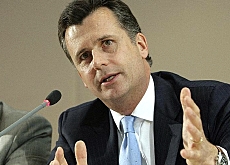Central bank warns of further rate rises

Thursday's key interest rate rise – the third in six months – is unlikely to be the last, Swiss National Bank governing board member Philipp Hildebrand tells swissinfo.
But Hildebrand says he is confident that any further tightening of monetary policy will not choke an expanding Swiss economy.
At a news conference in Geneva, the SNB announced it was increasing its target for the three-month Libor rate by a quarter of a percentage point to 1.5 per cent.
The central bank also said it expected the economy to expand by just over 2.5 per cent this year, revising its forecast upwards from just over two per cent in March.
swissinfo: What do you hope to achieve with this latest interest rate hike?
Philipp Hildebrand: It’s part of our normalisation strategy that we’ve talked about for quite some time. We came from a very low level of interest rates, we feel that the policy stance today is still expansionary and so further normalisation is required.
swissinfo: This is the third rise since December. Do you envisage further hikes this year?
P.H.: Given today’s vantage point and provided the economy continues to perform well, we judge that further normalisation steps will be required.
swissinfo: Is there a danger of further rate rises putting the brakes on the economy?
P.H.: There is clearly a fair amount of stimulus that has been withdrawn and there is a fair amount of restrictive momentum now in the pipeline. Interest rates have gone up, financial conditions have become more restrictive, so one would expect to begin to see some of that [having an effect] on output. We will watch the data carefully to see how the tightening that’s been done so far will reflect itself on the output side.
One of the reasons we proceeded gradually – and we were able to do that given the benign inflation outlook – was so as not to have an abrupt impact on output. So I am reasonably confident that this will be manageable.
swissinfo: You are now expecting economic growth for 2006 of around 2.5%, up from just over two per cent in March? What are the biggest threats to achieving this figure?
P.H.: The risks are really the same that we have talked about for some time. You have obviously still the global imbalances context and excessive volatility on the currency side. The second risk continues to be energy prices and a third risk would be an abrupt increase in long-term interest rates – or in the case of Switzerland, a sudden significant growth deterioration in the United States or elsewhere.
swissinfo: Stock markets tend to look six months ahead and judging where prices are at the moment they are not so optimistic about the future…
P.H.: I don’t think they are signalling to us at this point an abrupt change in the growth outlook. The global economy is in robust shape. But it is true that markets are signalling potentially some slowdown in the cycle, and again it’s a set of information that we will watch closely.
swissinfo: Swiss banks reported a substantial 59% increase in profit for 2005. Who is going to benefit from that? Customers?
P.H.: For our society as a whole it’s undoubtedly a good thing when our financial sector does well. There are the direct effects on employment and taxes, and there are indirect effects that impact on a substantial part of the economy through the financial sector. So I think it is on all accounts a positive development for the Swiss economy.
swissinfo-interview: Adam Beaumont
Thursday’s interest rate hike had been widely expected and follows similar steps by banks around the world, including the European Central Bank and the United States Federal Reserve.
The Swiss National Bank also announced that the economy grew by 3.5 per cent in the first quarter – the fastest pace in almost six years. It says it expects average annual inflation of 1.2%, despite the recent developments in oil prices.
The SNB reiterated its opposition to a proposal to use its profits to prop up the state pension scheme, saying such a move would threaten the bank’s independence and financial stability.
Switzerland’s central bank is independent of the government and is free to set interest rates.
Its policy goal is price stability, which it says is an important precondition for economic growth and prosperity.
It bases its monetary policy on a medium-term inflation forecast.
Its chosen reference interest is the three-month Libor rate (London Interbank Offered Rate).
Its profit is broadly speaking divided up among the cantons (two-thirds) and the federal government.

In compliance with the JTI standards
More: SWI swissinfo.ch certified by the Journalism Trust Initiative










You can find an overview of ongoing debates with our journalists here . Please join us!
If you want to start a conversation about a topic raised in this article or want to report factual errors, email us at english@swissinfo.ch.